Archive for May, 2018
Teams across region to calibrate water-quality sensors for Lake Erie buoy network
Monday, May 14th, 2018Scientists from nearly a dozen organizations throughout the region are visiting The University of Toledo Lake Erie Center Tuesday, May 15 to calibrate equipment that will be deployed in buoys across Lake Erie to measure water quality throughout algal bloom season.
“It’s like in the old movies when the mission leader says, ‘Let’s synchronize our watches,’ before the team splits up,” Dr. Tom Bridgeman, UT professor of ecology and director of the UT Lake Erie Center, said. “This collaboration helps to ensure conformity of data coming from the probes for the next few months.”
Partners in the early-warning buoy network will do the calibration between 9 a.m. and 2 p.m. Those include researchers from Bowling Green State University and Ohio State University, as well as water treatment plant operators in the cities of Oregon, Toledo, Elyria, Avon, Sandusky and Lorain. LimnoTech, YSI and Fondriest Environmental are local companies providing technology support.
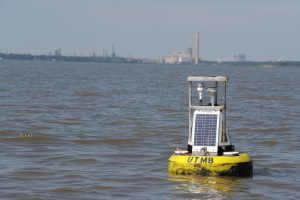 UT’s water quality and sensor buoy annually rides the waves off the shore of the Maumee Bay State Park Lodge and Conference Center in Oregon. It is part of an early-warning network of buoys throughout the western Lake Erie basin that provides live data vital in the assessment of harmful algal blooms.
UT’s water quality and sensor buoy annually rides the waves off the shore of the Maumee Bay State Park Lodge and Conference Center in Oregon. It is part of an early-warning network of buoys throughout the western Lake Erie basin that provides live data vital in the assessment of harmful algal blooms.
“We go out on our research vessel at least once a week for sampling throughout the summer, but the buoys are out there all the time,” Bridgeman said. “Even when it’s too rough for boats to be on the lake, the buoys can alert if something is developing or changing quickly.”
The buoys are equipped with what is called the YSI EXO sonde, a black and blue instrument comprised of several probes to measure various water quality parameters, including how much blue-green algae is present, water temperature, clarity, oxygen levels, turbidity and pH.
It’s one piece of the battle plan to track and combat the growing harmful algal bloom in order to sound the early warning for water treatment plant operators as they work to provide safe public drinking water.
“We are watching very closely and are prepared,” Bridgeman said.
Girls in Science Day at UT May 10
Wednesday, May 9th, 2018More than 160 sophomore high school girls will visit The University of Toledo Thursday, May 10 when prominent female scientists and engineers across the region will introduce them to the exciting world of science and technology careers through hands-on experiments and demonstrations.
The ninth annual Women in STEMM Day of Meetings, which goes by the acronym WISDOM, will take place from 8 a.m. to 2:15 p.m. on UT’s Main Campus and Health Science Campus.
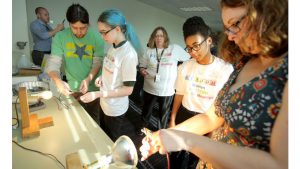 UT faculty and industrial professionals will help inspire a passion for science careers by exploring the tools of the trade.
UT faculty and industrial professionals will help inspire a passion for science careers by exploring the tools of the trade.
The girls will carry out investigations in a number of areas, including physics and astronomy, chemistry, biology, psychology, engineering, pharmacy and medicine.
Activities for students will include building solar cells, swabbing their cheeks for a DNA sample, building a motor, generating electricity on a bike, making biodiesel fuel, making lip balm and touring the anatomy museum.
Photo/video opportunities include:
- Building solar cells: 8:45 a.m. and 1:15 p.m. in Thompson Student Union Room 3016 on UT’s Main Campus;
- Building motors: 10 a.m. in North Engineering Building Room 1022 on UT’s Main Campus;
- DNA sampling: 8:45 a.m. and 1:15 p.m. in Thompson Student Union Room 3018 on UT’s Main Campus; and
- Making lip balm: 8:45 a.m. and 1:15 p.m. in Health Education Building Room 019-A on UT’s Health Science Campus.
Click here for the full schedule.
Broadway star to perform at Ryan White Program fundraiser for HIV care
Monday, May 7th, 2018Tony Award-wining star Jennifer Holliday, an original Broadway cast member of “DreamGirls,” will be the special guest during an evening of dining and music to support local HIV/AIDS patients.
“SweetDreams,” which is presented by The University of Toledo Medical Center’s Ryan White Program, takes place from 6 to 10 p.m. Saturday, May 12, at the Radisson Hotel on Health Science Campus.
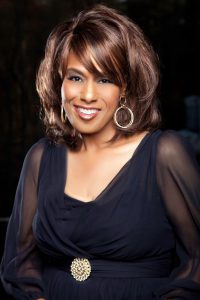
Jennifer Holliday
Funds raised at the event will go to the Ann Wayson Locher Memorial Fund for HIV Care, which supports HIV care for adults and children in the Toledo area.
Wayson Locher opened the first grant-funded free and anonymous HIV testing site in northwest Ohio in 1985 and was one of the key organizers for The University of Toledo’s Ryan White Program. The memorial fund was developed in her honor upon her death in 2010.
“Ann was passionate about providing support to those affected by HIV and AIDS,” said Richard Meeker, manager of community engagement for the Ryan White Program. “The memorial fund provides services for HIV and AIDS patients who have needs that cannot be covered by other agencies or programs in our community. Many individuals are living on a fixed income and need a little help when emergencies arise. That’s where we come in.”
The evening will include cocktails, Southern-style buffet dinner, jazz vocals by Toledo’s own Ramona Collins, and a program presentation on mental health challenges.
Holliday will give the keynote address and perform at the event. She is an advocate for mental health, HIV and LGBTQ rights.
Having struggled with depression herself, Holliday now shares her story of overcoming depression and stresses the importance of seeking medical treatment as the key to a successful recovery.
Holliday is an ardent philanthropist who uses her performances to bring hope to people in search of healing, as well as to raise funds and bring awareness to various causes that impact millions of people every day.
Tickets for the “SweetDreams” fundraiser are $150 each.
The Ryan White Program also is seeking sponsorships with opportunities that range from $1,000 to $5,000 and include VIP tickets for the meet-and-greet reception with Holliday and recognition at the event.
For more information or to purchase tickets, visit here.
May UT Board of Trustees meeting schedule
Friday, May 4th, 2018BOARD OF TRUSTEES MEETINGS
Wednesday, May 16, 2018
Driscoll Alumni Center, Schmakel Room
5:30 p.m. Board of Trustees Dinner
Monday, May 21, 2018
Mulford Library, Board Room
4 p.m. Privileging and Credentialing Sub-Committee Meeting
This subcommittee will enter Executive Session immediately upon convening
the meeting to discuss privileged information related to the evaluation of
medical staff personnel appointments.
Any questions may be directed to the Office of University Communications by calling 419.530.2410 or via email to meghan.cunningham@utoledo.edu.
Reminder: UT to hold commencement tomorrow
Friday, May 4th, 2018The highest number of students in at least 20 years is eligible to participate in The University of Toledo’s commencement on Saturday, May 5.
The more than 3,000 candidates for degrees will celebrate their achievement at the graduation ceremonies in the Glass Bowl. The undergraduate ceremony is scheduled for 10 a.m. and the graduate ceremony will be 3 p.m.
Included among those soon-to-be alumni is Robert Edgar Barger, who will receive his associate of technical studies degree from University College at the age of 96. He had attended UT after returning from serving in the United States Navy during World War II, but left before finishing his degree. After a recent review of his transcripts, it was determined the veteran met the requirements to graduate with an associate degree. Read more of Barger’s story here.
Chuck Ealey, the football great and businessman, is the commencement speaker and will receive an honorary doctor of humane letters.
As the UT quarterback, Ealey led the undefeated Rockets to 35 victories in three seasons from 1969 to 1971. After graduation, he joined the Canadian Football League and in his seven years in the league played for the Hamilton Tiger-Cats, Toronto Argonauts and Winnipeg Blue Bombers.
After hanging up his helmet, Ealey used his degree in economics from UT as a certified financial planner with Investors Group for 30 years. The 1972 UT alumnus also inspires through the Chuck Ealey Foundation, which helps people discover and embrace their undefeated spirit to better themselves and their community.
Dr. Helen Sun, chief technology officer of architecture, engineering and data management at JPMorgan Chase & Co. in Chicago, will address graduate students participating in the afternoon ceremony. She received a PhD in educational technology from UT in 2001.
Those planning to attend commencement are advised to use the west entrance off Secor Road and the south entrance off Dorr Street to avoid congestion on West Bancroft Street.
The public ceremonies also can be viewed live at utoledo.edu/video.
UT student selected for Fulbright Award
Thursday, May 3rd, 2018Soon-to-be-UT graduate Kristen Murray is undoubtedly the best argument for making sure to check junk email folders.
Murray, who will graduate May 5 with a bachelor of arts degree in global studies, received a prestigious gift last week — an email from J. William Fulbright Foreign Scholarship Board representatives notifying her that she’d been selected a Fulbright student ambassador to Mexico.
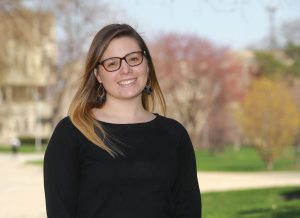
Kristen Murray
“I’d been waiting to hear because it’s been hard to plan the next year until I knew,” Murray, a Toledo native, said and chuckled. “My friend had just asked about it and said, ‘Whatever happens, happens for a reason,’ and there was the letter in my junk mail.”
Murray will be an English teaching assistant in a yet-unassigned area of Mexico from September 2018 to May 2019. The Bowsher High School graduate also submitted a plan to create a volleyball team in her Mexican community or participate in an existing program.
“They really want you immersed in the local community when you’re not teaching,” Murray said. “I played volleyball and coached seventh grade, freshman and varsity while in college, so it will be a great way to tie together all of my passions.”
The Fulbright Award is named for former U.S. Senator J. William Fulbright, who in 1945 introduced a bill to promote goodwill between the U.S. and other countries. Today, the program awards 3,500 student scholarships each year in research, study and teaching to 140 countries.
Being selected a Fulbright scholar is a competitive and, as Murray discovered, a lengthy process. She applied in summer 2017, was notified that she was a finalist in January (via an email in her junk folder), and endured a tough interview before receiving last week’s notification.
Murray’s global studies advisor, Dr. Jetsa Cáceres, associate professor in the Department of Political Science and Public Administration, said the award will have benefits beyond her time in Mexico.
“It’s a huge deal,” Cáceres said, noting that only 54 Fulbright Awards to Mexico are offered. “It gives students an opportunity to live abroad for a year and experience cultures, languages and opportunities they’ll never get in a classroom.
“Fulbright scholars have gone on to be Nobel prize winners, leaders in business, government and academia, and global trailblazers. If I was on a hiring committee and I had a choice of a candidate who had a Fulbright experience and one who did not, I’d choose the Fulbright scholar without even thinking.”
The Fulbright Award is another step toward Murray’s eventual goal of working in the U.S. Department of State with a specialty in Latin-American relations. She’s had internships in Peru, Cuba and Ecuador, and was elected by the Organization of American States as an international observer of the Ecuadoran election process in 2017.
Calling the experience “amazing,” Murray recalled, “I got to see firsthand one of the cornerstones of democracy, a presidential election in a different country. I got to talk to everyone in the town where I was living about the elections, including different groups such as Afro-Ecuadorans and indigenous Ecuadorans about the political climate and how it affected them.”
Murray understands the current U.S. political climate will be a topic of keen discussion once she arrives in her assigned city.
“I definitely think I’ll get a lot of questions about the current administration and the situation here in the U.S.,” she said. “That’s one of the reasons I should go. I think it’s important that people judge our country not only on news and policy, but from meeting me as a U.S. citizen and knowing me as an actual person.”
This summer, she’ll study for her GRE so she can apply to graduate schools in December. She plans to earn a master’s degree in Latin American affairs.
With an “about 80 percent” fluency in Spanish, Murray also intends to use her time in Mexico to master the language while immersing herself in the culture of its people.
“I think it’s important to understand the countries we’re creating policies with and making deals with,” she said. “A lot of times, the voices of those who are most affected by policy are left out of the discussion. I want to try to change that.”
UT medical student receives Sarnoff Fellowship for cardiovascular research
Tuesday, May 1st, 2018A third-year medical student at The University of Toledo College of Medicine and Life Sciences was selected as a 2018-19 Sarnoff Fellow.
Rahul Mital, who is studying to work in the field of pediatric cardiology, is one of nine students across the United States awarded the honor.
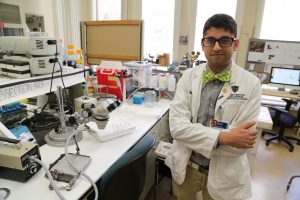
Rahul Mital, third-year medical student at The University of Toledo College of Medicine and Life Sciences
“This is a very competitive, prestigious award,” said Dr. Christopher Cooper, dean of the UT College of Medicine and Life Sciences and executive vice president for clinical affairs. “We are proud of Rahul and look forward to his achievements in cardiovascular research.”
The Sarnoff Fellowship program offers medical students enrolled in accredited U.S. medical schools the opportunity to spend a year conducting intensive work in a biomedical research facility in the United States other than the medical school in which they are enrolled.
“I’m humbled by the opportunity that lies ahead of me and plan to make the most of it,” Mital said. “Being a member of the Sarnoff Cardiovascular Research Foundation and partaking in world-class research while receiving mentorship and guidance is truly an invaluable step in achieving my goals.”
Rahul plans to study cardiogenesis, which is the development of the heart in the embryo, and how to use gene therapy as a potential treatment for congenital heart disease.
“No child deserves to be born with a congenital heart disease, but the unfortunate truth is that congenital heart disease is the most common type of birth defect, affecting 40,000 births per year in the United States alone,” Mital said. “If a greater understanding of the underlying pathophysiology is achieved, patient care can move away from expensive surgeries and lifelong follow-ups, and instead be focused at the molecular level.”
The full-time Sarnoff Fellowship is a one-year award of $32,000 for the 2018-19 academic year. Fellows also receive financial support for travel and moving expenses.
The 2018-19 Fellows were introduced last week at the Sarnoff Foundation’s 38th Annual Scientific Meeting in Boston.

